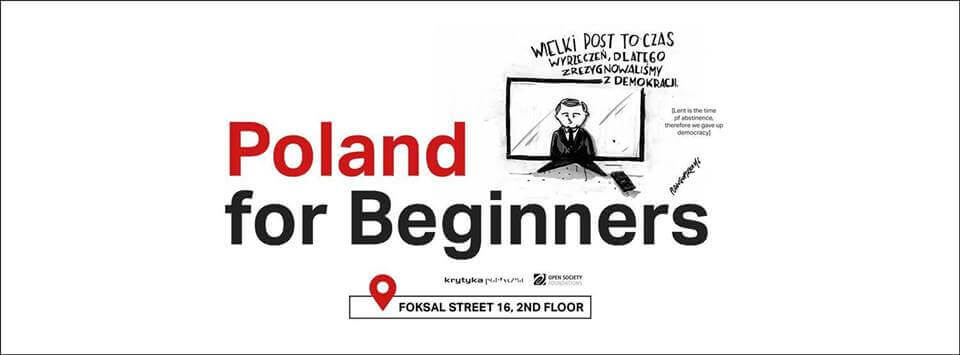Not from Poland? Interested in society, politics or culture, but having a hard time following discussions in Polish?
Krytyka Polityczna invites you to lectures in English that cover contemporary issues relating to Poland and the international sphere.
Come, Listen, Discuss!
Alien Media in Poland
May, 25th, Thursday, 18.00
The ethnic fiber of Polish cities is changing. There is an increasingly large number of nuclear families in which at least one of the parents is not an ethnic Pole and where languages other than Polish are spoken with the younger generation on a daily basis. Yet the presence of many of these people/ foreigners/ migrants/ ethnic minorities/ aliens/ refugees/ newcomers is not widely acknowledged by the locals. Even if the presence itself is acknowledged, they don’t really have a voice in the Polish mainstream.
This meeting of “Poland for Beginners” brings together editors of various diaspora/ minority magazines in Poland. The panelists will discuss the theme of “how much voice” they have been able to obtain in Polish society through their initiatives and to what extent they have succeeded in becoming a part of Polish culture.
More and more informal groups, collectives and NGOs are trying to tackle this new mottled culture. However, most Polish institutions and opinion-makers (including some of those considered to be progressives) seem tempted to ignore the point of view of the newcomers even when the latter’s interests are at stake – not necessarily with bad intent.
The newcomers’ feasibility to participate in the building of contemporary Polish culture is reduced to a minimum, even when migration is at a core of the inquiry, although they pay taxes and contribute to the development of local economies.
Nonetheless, the newcomers insist they have things to say. They argue that the Polish culture can be stronger and more vigorous with their contribution and, even more, that Polish contemporary culture can be produced in languages other than Polish. Often, they take the trouble to become interpreters of Polish culture into other cultures and also its imagemakers.
Do they feel totally silent, or is their opinion being taken into consideration, for example, in generating new policies? Do they feel objectified as migrants – invited to speak up merely in order to tick the minority inclusion box – or is their professional or “migrant” expertise of genuine interest to Poles?
Moderator: Teodor Ajder (co-founder and editor contributor of Mamaliga de Varsovia – mamaligadevarsovia.wordpre
Participants:
Claudia Ciobanu – co-founder and contributor editor of mamaligadevarsovia.wordpre
Angelo Emo – Editor and contributor at Gazzetta Italia/www.gazzettaitalia.pl/ poloniaoggi.pl
Ted Bergdahl – producer and publisher of Polenpodden, a politically and religiously unattached podcast covering Poland for Swedish audience.
Wassem Abou Hasan – editor in chief and founder of Polandinarabic.com.He contributes to AJ, Huffington Post, D’Envoy Magazine and Middle East Reviews as a freelancer.
Vlad Guzman – Mexican born, translator, writer, musician and cultural activist. Co-founder of the magazine Write the City, an online literary multilingual publication focusing on Otherness based in Warsaw. He is the main editor of the magazine and a coordinator of different creative writing workshops carried out in different places around Poland and Europe.
Daniel Tilles – one of the two editors and writers of the notesfrompoland.com/ and the blog’s facebook page.
Facebook event here.
![Political Critique [DISCONTINUED]](https://politicalcritique.org/wp-content/uploads/2015/09/Political-Critique-LOGO.png)
![Political Critique [DISCONTINUED]](https://politicalcritique.org/wp-content/uploads/2015/09/Political-Critique-LOGO-2.png)
